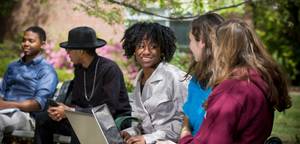Explore Jewish life and thought through interdisciplinary coursework, campus programming and both local and global perspectives. Minor in our program, pursue our electives or get involved in community engagement.
-
Academics
We offer an interdisciplinary minor that encompasses history, literature, religious studies and more.
-
Our People
We are a community of faculty, students and scholars committed to Jewish Studies.
-
Beyond the Classroom
We sponsor study abroad, student groups, public lectures and community events

New Courses
In Spring 2026 we will debut JSTU 101, an introduction to Jewish Studies, and a new Anne Frank course. These classes expand opportunities to explore Jewish history, culture and identity at USC.
Explore course offerings-
Essays by Andrew Berns on Jewish History & Thought
Explore Andrew Berns' essays on Judaism and Jewish history in his Substack series New Wine Old Vessels, offering rich insights into Jewish thought.
-
Faculty Spotlight: Black–Jewish Solidarity Podcast
Professors Meir Muller and Devin Randolph join the Adapting Podcast to explore Black-Jewish solidarity and ways to fight antisemitism and racism.
-
Faculty Podcast: Life Across Borders & Cultures
Discover Take On Life, a podcast by F.K. Clementi exploring identity, imagination, and global experiences through intimate conversations.









